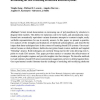Free Online Productivity Tools
i2Speak
i2Symbol
i2OCR
iTex2Img
iWeb2Print
iWeb2Shot
i2Type
iPdf2Split
iPdf2Merge
i2Bopomofo
i2Arabic
i2Style
i2Image
i2PDF
iLatex2Rtf
Sci2ools
120
click to vote
ML
2010
ACM
2010
ACM
On the infeasibility of modeling polymorphic shellcode - Re-thinking the role of learning in intrusion detection systems
Current trends demonstrate an increasing use of polymorphism by attackers to disguise their exploits. The ability for malicious code to be easily, and automatically, transformed into semantically equivalent variants frustrates attempts to construct simple, easily verifiable representations for use in security sensors. In this paper, we present a quantitative analysis of the strengths and limitations of shellcode polymorphism, and describe the impact that these techniques have in the context of learning-based IDS systems. Our examination focuses on dual problems: shellcode encryption-based evasion methods and targeted “blending” attacks. Both techniques are currently being used in the wild, allowing real exploits to evade IDS sensors. This paper provides metrics to measure the effectiveness of modern polymorphic engines and provide insights into their designs. We describe methods to evade statistics-based IDS sensors and present suggestions on how to defend against them. Our experi...
| Added | 29 Jan 2011 |
| Updated | 29 Jan 2011 |
| Type | Journal |
| Year | 2010 |
| Where | ML |
| Authors | Yingbo Song, Michael E. Locasto, Angelos Stavrou, Angelos D. Keromytis, Salvatore J. Stolfo |
Comments (0)

